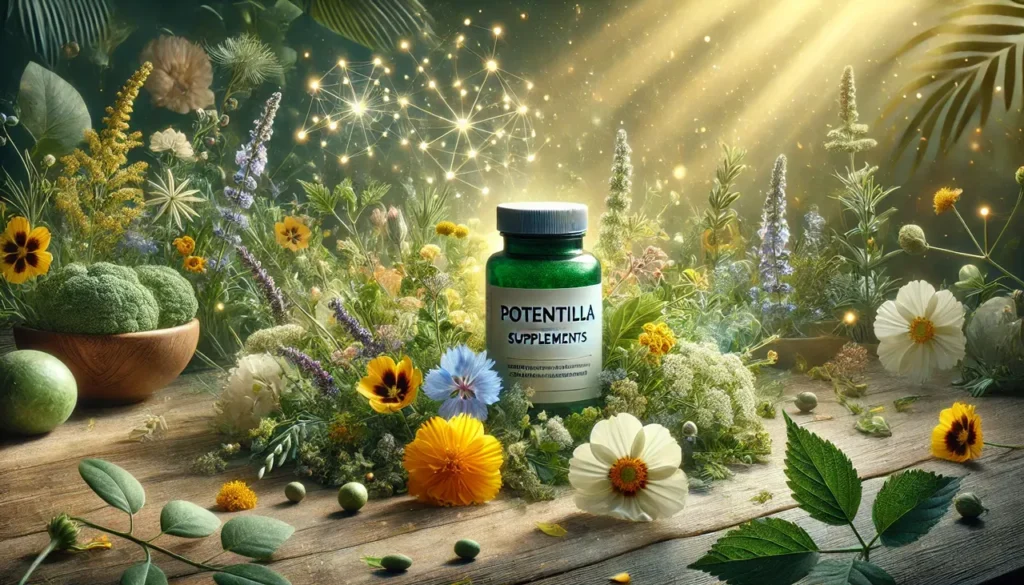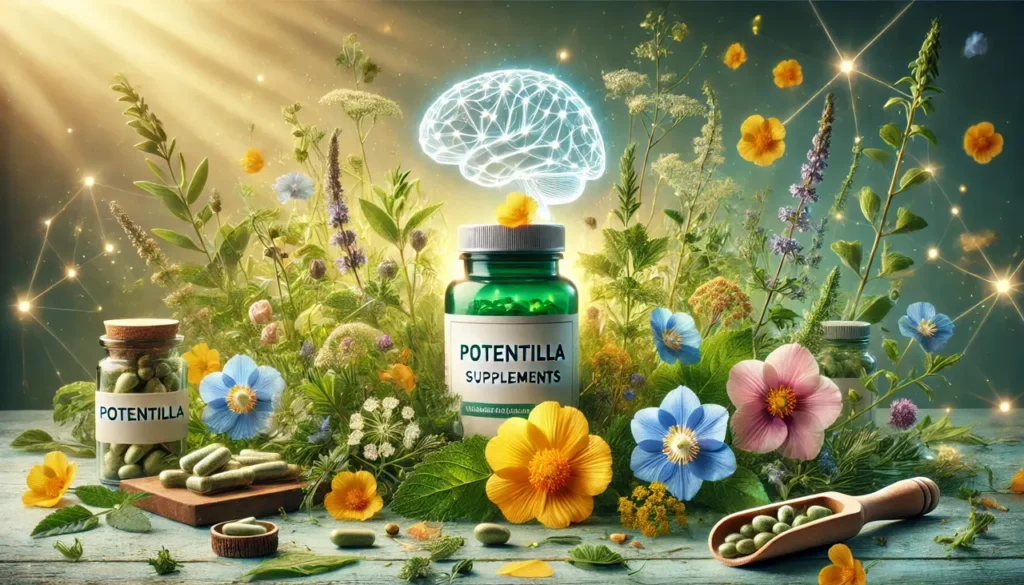Potentilla, commonly known as the cinquefoil, refers to a genus of flowering plants belonging to the rose family (Rosaceae). While many species of Potentilla are admired for their ornamental value in gardens, some varieties have drawn increasing interest for their potential medicinal properties, particularly as nootropic supplements. Nootropics—also known as cognitive enhancers—are substances that may improve cognitive function, memory, creativity, or motivation in healthy individuals. This article explores the potential nootropic benefits of Potentilla, detailing its chemistry, physiological mechanisms, recommended dosages, side effects, interactions with other substances, and crucial considerations for safe supplementation.
You May Also Like:
Sources of Potentilla
Potentilla species are found in a variety of habitats across the globe, from temperate regions to mountainous areas. Notably, Potentilla erecta, also known as tormentil, is recognized for its medicinal properties. Historically, tormentil root has been used in traditional medicine for its astringent, anti-inflammatory, and antioxidant effects. Its leaves, roots, and flowers have been utilized in herbal remedies, primarily in Europe and Asia, for ailments ranging from digestive issues to wounds.
Additionally, various other Potentilla species, such as Potentilla anserina (silverweed) and Potentilla fruticosa (bush cinquefoil), have been investigated for their potential health benefits, further expanding the body of knowledge surrounding the genus. The common medicinal uses of Potentilla have piqued interest in its application as a nootropic supplement, particularly for enhancing cognitive function.

Chemistry of Potentilla
The pharmacological properties of Potentilla can be attributed to its rich array of active compounds, including flavonoids, tannins, phenolic acids, and saponins. These phytochemicals exhibit various biological activities that may contribute to Potentilla’s nootropic effects.
Active Compounds
- Flavonoids: Potentilla species are rich in flavonoids, which are known for their antioxidant properties. These flavonoids help combat oxidative stress, which can lead to cellular damage and cognitive decline. Flavonoids such as quercetin and kaempferol have been extensively studied for their neuroprotective effects, potentially aiding in memory and cognitive function.
- Tannins: Tannins are polyphenolic compounds found in Potentilla that possess astringent properties. They can help protect neuronal cells from oxidative damage and inflammation, both of which are critical factors in neurodegenerative diseases.
- Phenolic Acids: Compounds such as rosmarinic acid and ellagic acid found in Potentilla have been associated with anti-inflammatory and neuroprotective effects. These acids contribute to overall cognitive health by reducing inflammation and oxidative stress in the brain.
- Saponins: Saponins have shown potential in enhancing neuroprotective effects and supporting cognitive function. Research indicates that saponins may modulate neurotransmitter activity, thereby influencing cognitive processes.
Understanding these active compounds helps elucidate the mechanisms through which Potentilla may exert its nootropic effects on the body and brain.

Physiological Mechanisms of Potentilla in the Body and Brain
The nootropic effects of Potentilla can be attributed to several physiological mechanisms that influence brain health and cognitive function.
Antioxidant Activity
Oxidative stress is a major contributor to cognitive decline and the development of neurodegenerative diseases. Potentilla’s flavonoids and phenolic compounds exhibit potent antioxidant activity, helping to neutralize free radicals and reduce oxidative damage. By lowering oxidative stress levels in the brain, Potentilla may protect neurons and enhance cognitive performance.
Anti-Inflammatory Effects
Chronic inflammation in the brain is linked to cognitive impairment and neurodegenerative disorders. Potentilla’s active compounds, particularly tannins and flavonoids, possess anti-inflammatory properties that may help modulate inflammatory pathways. This modulation may contribute to improved cognitive function by preserving neuronal integrity and promoting overall brain health.
Neurotransmitter Modulation
Potentilla may influence neurotransmitter systems involved in memory and cognition. Some studies suggest that certain compounds in Potentilla can enhance the synthesis and release of neurotransmitters, such as acetylcholine and serotonin. Acetylcholine is crucial for learning and memory, while serotonin plays a role in mood regulation and overall cognitive function.
Neuroprotection
Research indicates that Potentilla may provide neuroprotective benefits by preventing neuronal apoptosis (programmed cell death) and supporting neuronal survival. This protective effect can help maintain cognitive function, particularly in individuals at risk for neurodegenerative diseases.
Support Focus, Mental Resilience, and Stress Relief with Rhodiola Rosea—Available Now on Amazon!

Nootropic Benefits of Potentilla
While the research on Potentilla as a nootropic is still developing, several potential benefits warrant consideration.
1. Enhanced Memory and Learning
The antioxidant and anti-inflammatory properties of Potentilla may contribute to improved memory and learning capabilities. By reducing oxidative stress and inflammation in the brain, Potentilla may create an environment conducive to neurogenesis (the growth of new neurons) and synaptic plasticity, both of which are vital for learning and memory.
2. Mood Enhancement
Potentilla’s influence on neurotransmitter systems may also enhance mood and emotional well-being. By promoting the synthesis and release of serotonin, Potentilla may contribute to improved mood regulation, which can positively impact cognitive performance and motivation.
3. Neuroprotection Against Age-Related Decline
The neuroprotective effects of Potentilla may be particularly beneficial for aging populations. By safeguarding neurons from oxidative damage and inflammation, Potentilla could potentially slow cognitive decline associated with aging and reduce the risk of neurodegenerative diseases such as Alzheimer’s and Parkinson’s.
4. Reduction of Anxiety and Stress
Some studies suggest that the calming effects of Potentilla may help alleviate anxiety and stress. By modulating neurotransmitter levels and reducing inflammation, Potentilla may promote relaxation and mental clarity, supporting cognitive function under stress.

Dosage and Supplementation Guidelines
While research on Potentilla as a nootropic is still in its infancy, understanding appropriate dosage and supplementation guidelines is crucial for safety and efficacy.
Recommended Dosage
Currently, there is no established Recommended Daily Allowance (RDA) for Potentilla. However, various studies have utilized different dosages of Potentilla extracts:
- General Nootropic Dosage: For cognitive enhancement, a common dosage range for herbal extracts is between 300 to 600 mg of standardized extract daily. This dosage should provide sufficient bioactive compounds to elicit potential cognitive benefits.
- Clinical Studies: Some clinical trials investigating the effects of Potentilla have used dosages up to 1,000 mg per day without significant adverse effects. However, individuals should consult a healthcare professional to determine the appropriate dosage for their specific needs and health conditions.

Supplement Forms
Potentilla supplements are available in various forms, including capsules, powders, and tinctures. When selecting a supplement, individuals should look for standardized extracts that specify the concentration of active compounds to ensure consistent potency and effectiveness.
Side Effects and Safety
Potentilla is generally considered safe for most individuals when taken at recommended dosages. However, some people may experience mild side effects, including:
- Gastrointestinal Disturbances: Some users may report mild gastrointestinal issues such as nausea, diarrhea, or upset stomach, particularly at higher doses.
- Allergic Reactions: Though rare, individuals sensitive to the Rosaceae family may experience allergic reactions, such as skin rashes or itching. Those with known allergies should consult a healthcare provider before using Potentilla.
- Interactions with Medications: Potentilla may interact with certain medications, particularly those that affect neurotransmitter levels, such as antidepressants and anxiolytics. It is vital to consult with a healthcare professional before combining Potentilla with prescription medications.
Risks for Individuals with Certain Health Conditions
While Potentilla is generally safe, certain populations may need to exercise caution:
- Pregnant and Breastfeeding Women: There is insufficient research on the safety of Potentilla during pregnancy and lactation. Women in these categories should avoid Potentilla unless advised otherwise by a healthcare professional.
- Individuals with Hormonal Disorders: Potentilla may have estrogenic effects due to its phytochemical composition. Individuals with hormone-sensitive conditions should consult a healthcare provider before using Potentilla.
- Individuals with Autoimmune Disorders: The immune-modulating effects of Potentilla could potentially exacerbate symptoms in individuals with autoimmune disorders. Those with such conditions should approach Potentilla with caution.
Interactions with Other Supplements and Medications
Understanding potential interactions between Potentilla and other supplements or medications is crucial for safe use.
1. Antidepressants and Anxiolytics
Potentilla may enhance the effects of certain antidepressants due to its potential influence on neurotransmitter systems. However, this interaction could lead to increased side effects or serotonin syndrome in susceptible individuals.
2. Anticoagulants and Antiplatelet Drugs
Given its anti-inflammatory properties, Potentilla may affect blood clotting. Individuals taking anticoagulant or antiplatelet medications should consult a healthcare professional before using Potentilla, as it may increase the risk of bleeding.
3. Other Nootropics
Potentilla can be combined with other nootropic supplements to potentially enhance cognitive function. However, users should monitor their response, as excessive stimulation of neurotransmitter systems may lead to adverse effects such as anxiety or insomnia.
Top Stress Relief and Anxiety Supplements to Promote Relaxation and Calm—Available on Amazon!

Conclusion: Should You Consider Potentilla as a Nootropic?
Potentilla’s rich array of active compounds and its potential antioxidant, anti-inflammatory, and neuroprotective properties make it a promising candidate for supporting cognitive function and overall brain health. While current research highlights its potential benefits, further studies are necessary to establish optimal dosages, long-term safety, and efficacy.
As with any supplement, individuals should approach Potentilla with caution and consult a healthcare professional, particularly if they are taking medications or have underlying health conditions. By considering personal health status and potential interactions, users can make informed decisions about incorporating Potentilla into their wellness regimen.
Overall, Potentilla represents an intriguing area of exploration in the realm of nootropics, and its historical medicinal uses and current research provide a foundation for its potential in enhancing cognitive health.

References:
- Potentilla. Retrieved from: https://www.rxlist.com/supplements/potentilla.htm
- Antioxidant Capacity of Potentilla paradoxa Nutt. and Its Beneficial Effects Related to Anti-Aging in HaCaT and B16F10 Cells. Retrieved from: https://pmc.ncbi.nlm.nih.gov/articles/PMC9003520/
- Pharmacological evaluation of Potentilla alba L. in mice: adaptogenic and central nervous system effects. Retrieved from: https://pubmed.ncbi.nlm.nih.gov/21428737/
Important Note: The information contained in this article is for general informational purposes only, and should not be construed as health or medical advice, nor is it intended to diagnose, prevent, treat, or cure any disease or health condition. Before embarking on any diet, fitness regimen, or program of nutritional supplementation, it is advisable to consult your healthcare professional in order to determine its safety and probable efficacy in terms of your individual state of health.
Regarding Nutritional Supplements Or Other Non-Prescription Health Products: If any nutritional supplements or other non-prescription health products are mentioned in the foregoing article, any claims or statements made about them have not been evaluated by the U.S. Food and Drug Administration, and such nutritional supplements or other health products are not intended to diagnose, treat, cure, or prevent any disease.


